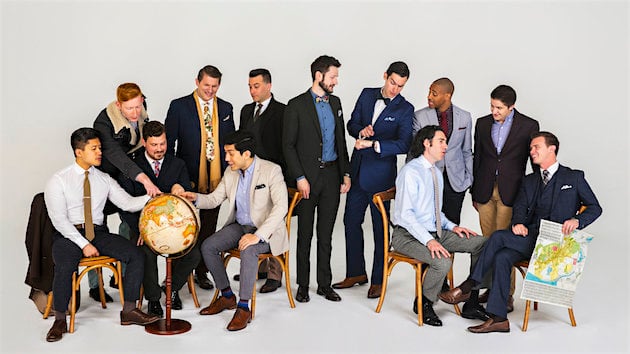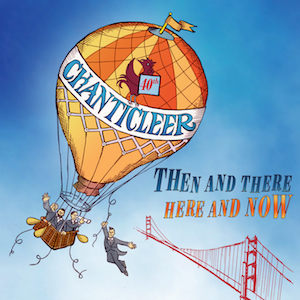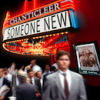
The 19 superbly engineered tracks on Chanticleer’s latest recording for Warner Classics, Then and There / Here and Now, take us on a magical mystery tour of sorts through 40 years of great singing. Starting with three short works by Palestrina, di Lasso, and Byrd that Chanticleer founder Louis A. Botto likely programmed early on, Then and There / Here and Now gives us a broad overview of the ensemble’s evolution.
 Even as Chanticleer groupies (myself included) will ooh and ah as they recall familiar faces in booklet photos that date from 1981 to the present, they will also marvel at the consistently steady and sonorous bass foundation supplied by the ensemble’s one long-term constant — 29-year veteran Eric Alatorre. They will also note a change in balance from times when there were more lower voices to the current blend, under four-year music director William Fred Scott, of six countertenors, three tenors, and three “baritone and bass.”
Even as Chanticleer groupies (myself included) will ooh and ah as they recall familiar faces in booklet photos that date from 1981 to the present, they will also marvel at the consistently steady and sonorous bass foundation supplied by the ensemble’s one long-term constant — 29-year veteran Eric Alatorre. They will also note a change in balance from times when there were more lower voices to the current blend, under four-year music director William Fred Scott, of six countertenors, three tenors, and three “baritone and bass.”
That change, while mostly for the good, produces a top-dominant sound that, on a few selections including Stacy Garrop’s fairly recent arrangement of the Hungarian-Romani “Járba, Máré Járba,” crosses the line into camp. But when Chanticleer’s soprano/countertenor sound perfectly suits the music at hand, e.g. in di Lasso’s “Surrexit Pastor Bonus” or Cortez Mitchell’s soprano solos in Kirby Shaw’s arrangement of Gershwin’s “Summertime” and Joseph Jennings’s moving arrangement of “Keep Your Hand on the Plow,” the results are memorable. In fact, so many of the selections are so impeccably vocalized that you will likely surrender happily to the beauty and joy of it all.
Less happily, Chanticleer goofs on tenor Brian Hinman’s recent arrangement of Shalom Secunda’s “Bei Mir Bist du Schön.” When the ensemble sings the intro, “Of all the boys I’ve known — and I’ve known some — until I first met you, I was lonesome,” they change the noun “boys” to “girls.” I know that Chanticleer is not a “gay ensemble”— I was once read the riot act for mistakenly calling it such in the Bay Area Reporter —but that does not make opting for the hetero-normative way out of possible assumptions about sexual orientation any less discomforting.
This is 2018, after all. It’s over 90 years since sopranos and mezzos starting with Elena Gerhardt and then Lotte Lehmann began singing Schubert’s cycles for male voice without changing pronouns. So why do it here? I can only imagine the internal discussions that took place over what pronoun to use. In San Francisco, of all places, in our era of “their and them” rather than “he or she,” Chanticleer’s decision is downright silly and patently offensive.
No apologies needed for Chanticleer’s superb singing, however. Respective kudos to Leslie Ann Jones and Dann Thompson’s recording and engineering and Michael Romanowski’s mastering, which enable Chanticleer to shine in 24/96 download format.




